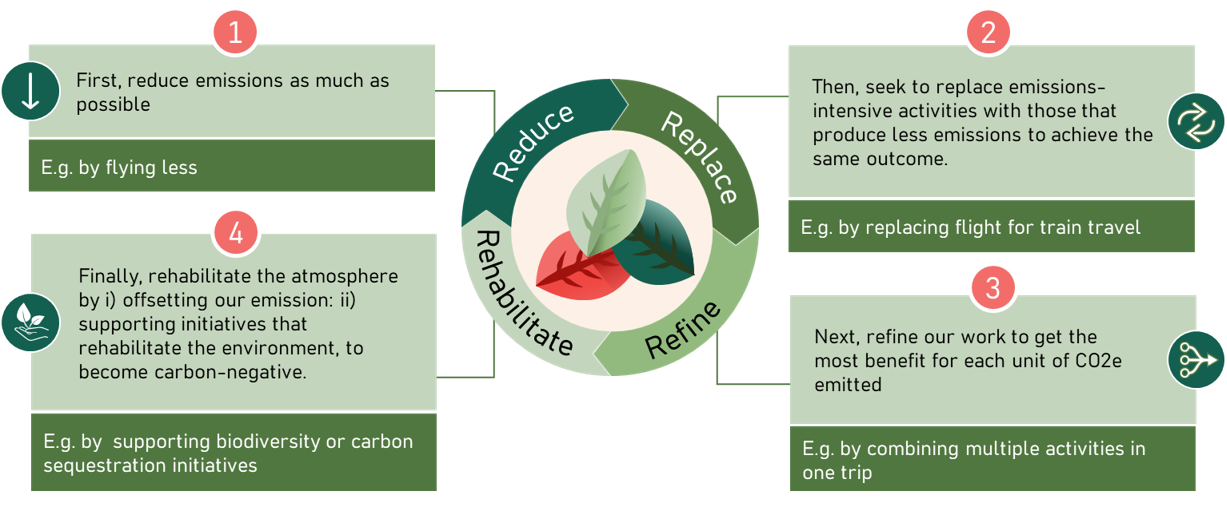The impact of climate change is present in all areas of our work. Itad is committed to taking urgent and ongoing action to effectively respond to the climate emergency, both in the work we do and through our business operations.
A year after launching our emission reduction plan, we have published an annual progress report to share updates and learning on our planned actions and targets – and ask the important question: what’s next?
Read more about our work on climate action
Itad’s green ambition
In 2021, we became a Net-Zero company. With our carbon offsetting partner, Earthly, we audit our Carbon Dioxide equivalent (CO2e) emissions yearly and offset 110% of them.
Last year, we published our Emissions Reduction Plan (2022-2025) committing to monitor and steadily reduce our emissions to reach ‘carbon negativity’, guided by the 4R framework.

However, sustainable and meaningful action on climate requires more than just offsetting our emissions. We recognised that true carbon negativity requires direct and active removal of carbon from the atmosphere, which is not feasible for our business model and claiming such could inadvertently contribute to greenwashing practices.
Instead, we have moved away from the term ‘carbon negativity’ to focus on becoming truly net-zero by increasing the scope of our CO2e measurement and our efforts on reduction.
To ensure accountability and share learning we will report yearly on progress against our goals.
2023 Emission Reduction progress: key findings
“Reduce emissions as much as possible”
- At company level, we are ahead of our target for the last financial year (2022/23), although emissions have increased relative to revenue from the previous year.
- At project level, we are close to achieving our carbon intensity target.
- We have seen successful internal behaviour change alongside increased client demand for remote meetings and collaboration with in-country consultants.
What’s next? We will build on these success to continue reducing our company and project-level emissions.
“Replace emission-intensive activities [or] get the most benefit for each unit of CO2e emitted”
- We organised training on Open Data Kit (ODK) to support remote data collection. Since it was delivered, two projects have used this to decrease the need for international travel.
- We have placed an emphasis on company-wide behaviour change, including introducing guidelines on travelling only when necessary. As a result, we have seen increasingly fewer requests for air travel for short meetings and consistent replacement of air travel with train travel to reach mainland Europe.
- When we have decided to fly, we have seen increased efforts by consultants to make the most of this by asking colleagues to identify further opportunities to connect with independent consultants, partners and clients while they are doing so.
What’s next? We plan on continuing to sensitise our staff on travelling only when necessary. We want to improve the way we capture success stories of replacing and refining carbon-intensive activities to better celebrate them and ensure continued buy-in.
“Increase the scope and accuracy of our emissions audit”
- Due to time constraints, we have not yet fully reviewed our measurements and are relying on estimates for hotel stays, commuting and energy usage from working from home.
- However, we have increased the accuracy of measurement for office energy, hotel bookings and commuting in our last audit, as well as adding additional estimates for in-country travel.
- Itad’s Green Team supported our recent office move, to ensure that a space was chosen with our emissions reduction plan and environmental concerns in mind.
What’s next? We are prioritising progressing the accuracy of our emissions measurement.
“Supporting initiatives that rehabilitate the environment”
- We are successfully maintaining our partnership with Earthly. Our remaining emissions are offset through investment in rigorously assessed carbon-credit projects that use nature-based solutions.
- We have not yet initiated any further rehabilitate activities due to time constraints.
What’s next? We remain committed to exploring feasible and impactful rehabilitation projects to engage in.

